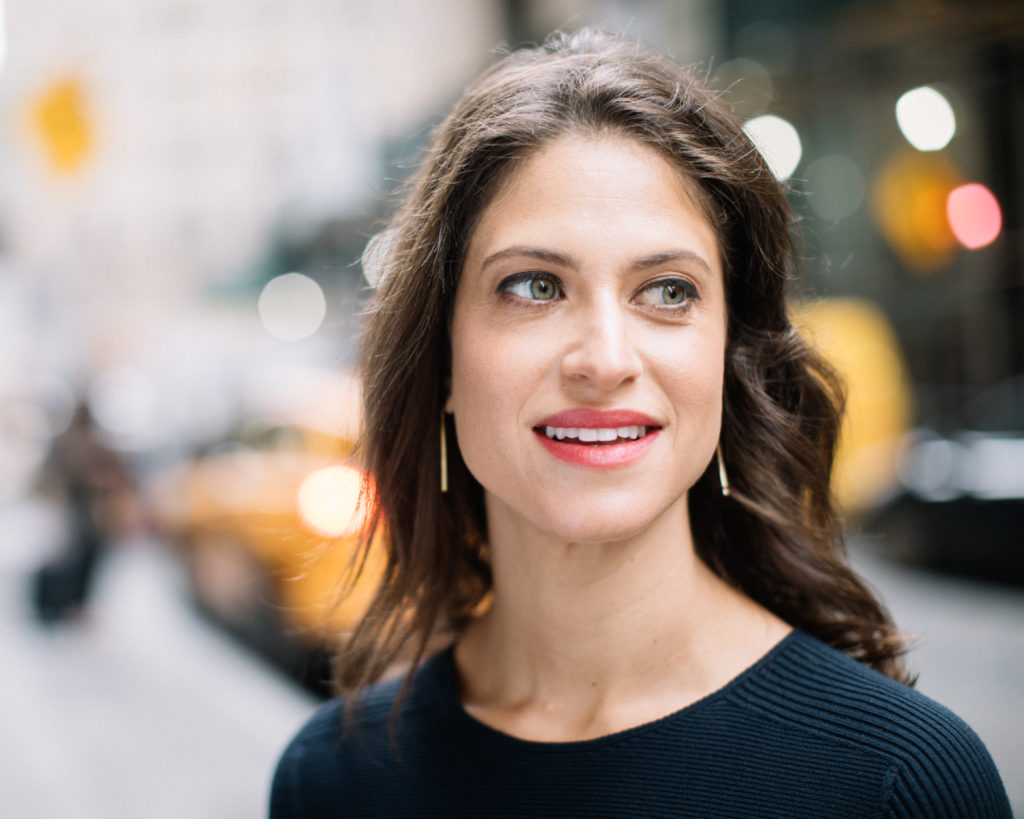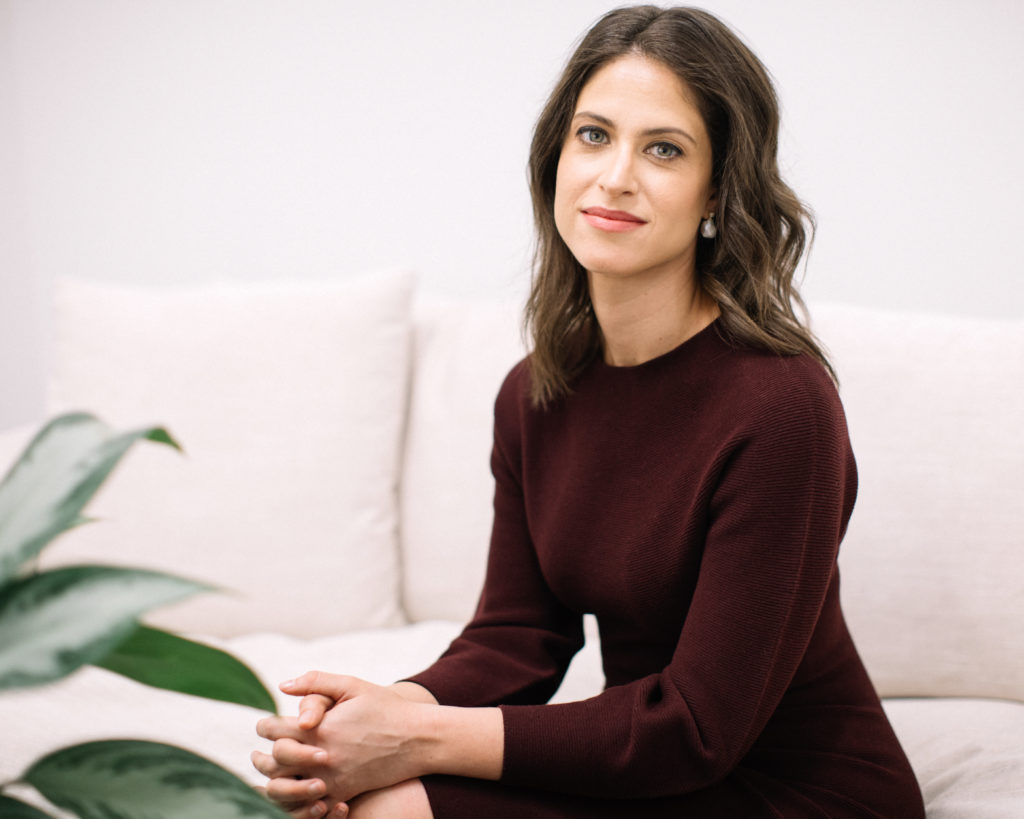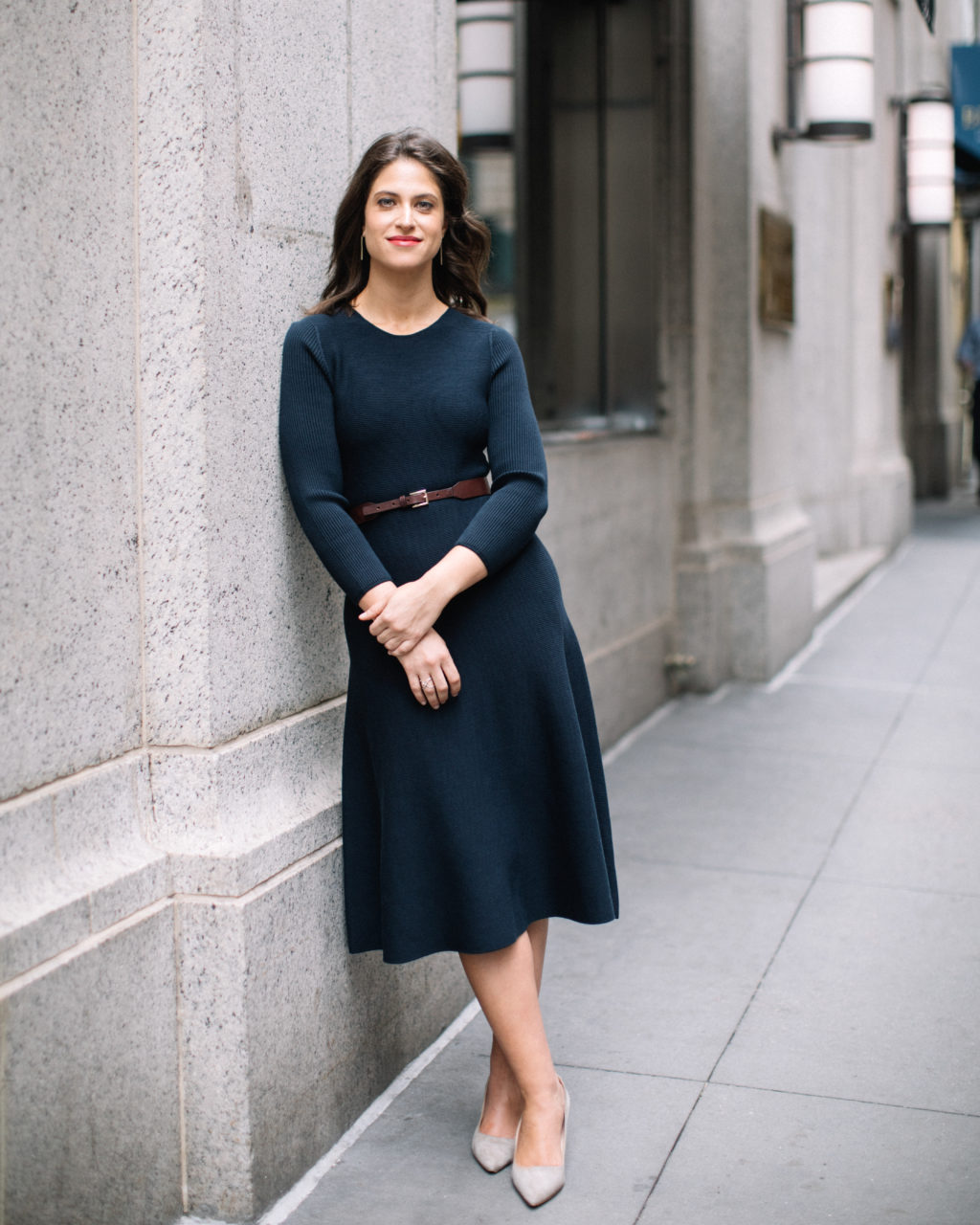Psychiatrist Alexandra Sacks on “Matrescence” and What No One Tells You About Motherhood
November 21, 2018 | Filed in: Woman of the Week
If you’ve never heard of “matrescence”—a term used to describe the physical and psychological transition to motherhood—let psychiatrist Alexandra Sacks enlighten you. She’s given a TED Talk on the subject (the talk has gotten over a million views since September), written an article about it for The New York Times, and co-authored a book, What No One Tells You: A Guide to Your Emotions from Pregnancy to Motherhood, available next year. Here, she talks about why it’s still hard to open up about the complex emotions around fertility and parenthood, and what we can do about it.

Alexandra wears the Holley dress, Strap belt, and Williamina earrings.
WHEN I WAS IN COLLEGE, I was interested in psychology, but I also thought I might go into journalism—I was an English major. After graduation, I worked for V-Day, a foundation that raises awareness about violence against women. Then I got into a medical school program that was looking for humanities-oriented students who wanted to become doctors. If I hadn’t joined that program, I might have gone to grad school for psychology. Instead, I got on track to get a medical degree, and became a psychiatrist.
MEDICAL SCHOOL WAS A WILD RIDE because I was not a hard-science person. I struggled a lot in some of my classes, and there were times when I doubted my path. But at the end of the day, medical training is mostly about working with people, and my interest in people’s stories was always relevant, no matter where in the hospital I was working. Ultimately, I knew that I wanted to be in women’s health, and use words rather than my hands—I wasn’t going to be delivering babies. Then I found out about the field of women’s mental health, and I thought, Ding-ding-ding! This is where I belong.
PSYCHIATRY IS VERY DIFFERENT FROM OTHER FIELDS OF MEDICINE. It’s much more about language and narrative, and my writing skills are helpful there. It doesn’t matter that I’m not so great at chemistry and math, or that I’m not a good surgeon. Homing in on psychiatry was a good lesson for me to focus on my strengths instead of trying to fight my weaknesses. When you put all your energy into your strengths, that’s what other people will see, too.
WOMEN’S HEALTH IS SUCH AN UNDERSERVED AREA. When I started, I was focused on postpartum depression. There’s a history of doctors not knowing how to advise women about antidepressants during pregnancy because the FDA basically doesn’t approve clinical trials that include pregnant women. It wasn’t until the 1990s that the U.S. passed a law to get the FDA to include more women in clinical research. Women were previously excluded—and often still are—pretty much for two reasons: One, researchers worry that female test subjects could become pregnant and don’t want to risk compromising the pregnancy. And two, researchers were concerned that women’s menstrual cycles could skew the data. As a result, a lot of our scientific data may not be applicable to women’s health.

Alexandra wears the Amanda dress and Capri earrings.
WHILE I WAS STUDYING REPRODUCTIVE PSYCHIATRY, I noticed an interesting pattern: Many of my patients thought they had postpartum depression, but didn’t meet the clinical diagnostic criteria. I found that many women didn’t know basic information—like how common miscarriages are, or that it’s normal to struggle with breastfeeding, or how much better they’d feel if they got some exercise and slept more. Once we discussed these subjects, most of the women in this group improved after one or two sessions. I thought, They don’t have postpartum depression. They just need to know that this is normal.
ALL OF THESE CONVERSATIONS WITH NEW MOMS led me to anchor my work around the concept of matrescence—the transition to motherhood. It’s such an elegant, simple concept, coined by medical anthropologist Dana Raphael in the 1970s. In many ways, it’s similar to adolescence, in that it’s a shift in hormones and identity. When I did a TED Talk, my goal was to give people the language, permission, and encouragement—from a medical authority—to discuss matrescence without shame. Over 1.2 million people have seen the talk by now, and women’s health activists have been reaching out to me from all over the world—Portugal, Australia, New Zealand, Zimbabwe—which is exactly what I was hoping for.
I HAVE YET TO TALK TO SOMEONE who isn’t deeply, deeply motivated to be the best mom they can be. But every mother only has to be good enough. Donald Winnicott, a British psychoanalyst, came up with the concept of the good-enough mother in the 1960s. He saw that women expected themselves to be perfect, and it just wasn’t possible. When you become a parent, you’re still a human being with your own needs and flaws. There will be times when you need to leave your baby crying in the crib while you go to the bathroom or eat something, because you have a human body.

Alexandra wears the Holley dress, Strap belt, and Williamina earrings.
IN THE MODERN ERA, WOMEN ARE ENCOURAGED to keep their lives running on all cylinders when they have children—they’re told to keep money in their bank accounts, hold down a good job, feel good about their appearance, and maintain good relationships with their partners and friends. In many ways, that’s great. The modern woman has so many more opportunities to see herself as more than a parent. But it can also create a confusing push-pull dynamic. When a baby plops itself in the center of your world, you’re going to feel pulled between the baby and the other parts of your identity, and that push-pull is a big source of confusion and anxiety for a lot of women. They think, If I want to spend time doing other things, away from the baby, does that mean I’m a bad mom? No, it means you’re human. And it’s a good thing to keep paying attention to those other parts of your life, too. When you preserve your own identity, you also leave room for your child to develop their own.
WHAT’S NEXT FOR ME? I’m interested in looking at pre-motherhood phases of development, and working on the fertility identity arc with younger women and girls. Today, girls are taught that they can do anything, and that they should think of themselves as having all the same opportunities as boys. And that’s totally true. But it is also true that they have a biological clock that’s different from boys. And I don’t think we’re educating young women and girls about this in a way that’s empowering. I speak to so many women in their late twenties and thirties who are afraid of their biological clock, and who approach this part of their bodies and lives with feelings of panic. Even “biological clock” seems like a negative term—it implies a countdown. I want to figure out how to talk to younger women and girls about their fertility in a way that doesn’t make it seem like a problem to solve.

Alexandra wears the Arbus sweater, Madison skirt, and Capri earrings.
I’M A HUGE ADVOCATE FOR PATERNITY LEAVE. When men are also seen as people whose lives and careers will be impacted by having children, that’s when genders will have equal opportunities in the workplace. Obviously, paid maternity leave is important too, but it’s an impossible uphill battle for women if they just get more leave and less work. Some women don’t want to work less. Instead, we want to set up more equal expectations for childcare, in terms of division of emotional and physical labor.
I NEVER GET SICK OF TALKING ABOUT MATRESCENCE. Well, sometimes I get sick of hearing myself talk, but the topic stays interesting because I learn so much from other people’s responses to it. In today’s political climate, it never feels unimportant to talk about women’s issues. I never think, What’s the point? It’s incredibly rewarding, and there’s so much to be done.
Photos by Rich Gilligan. Styled by Sam Michel.





